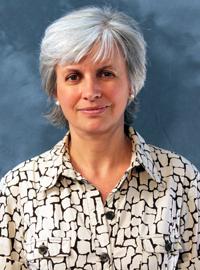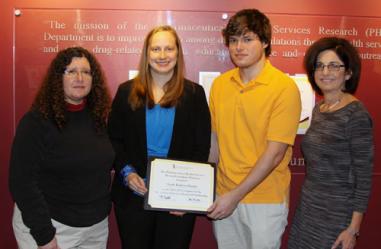PHSR Graduate Program “One of the Best” Following Program Review
Reviewers commend program’s faculty, staff, and students for their efforts to advance the field of pharmaceutical health services research.

By Malissa Carroll
May 9, 2013
Following the successful completion of a thorough self-study and comprehensive on-site visit, a team of external reviewers has identified the Pharmaceutical Health Services Research (PHSR) graduate program at the University of Maryland School of Pharmacy as one of the best programs of its kind in the nation.
“We are very proud of the comments and feedback from our site visit team,” said Ilene Zuckerman, PharmD, PhD, professor and chair of PHSR. “Their evaluation reflects the quality and commitment of our faculty, students, and staff.”
The University System of Maryland requires each of its doctorate programs to complete a program review once every seven years. Preparation for the PHSR graduate program review began in 2012 with participation from the department’s executive committee, which includes Zuckerman, Francoise Pradel, PhD, associate professor and PHSR graduate program director, Linda Simoni-Wastila, BSPharm, MSPH, PhD, professor and vice chair of research for PHSR, Robert Beardsley, PhD, professor and vice chair of education for PHSR, and Ebere Onukwugha, MS, PhD, assistant professor in PHSR.
Pradel worked with Colleen Day, academic coordinator for the PHSR graduate program, to collect and organize program data for the internal self-study. She met with faculty throughout the department to collect feedback about the program’s strengths and weaknesses, and gathered insights from students to include in the report. Pradel and Day used this data to draft the initial self-study, which was reviewed by other members of the executive committee before being submitted to the University’s Graduate School.
“Although the process can require a substantial time commitment, completing the self-study is a good exercise for graduate programs,” says Pradel. “It allows you to reflect on your program and make a concerted decision about what you want to do next. It’s very informative and helps you determine which aspects of your program could be improved.”
To complete the review process, an external review team visited the School of Pharmacy in late February. This team – comprised of Richard Schulz, PhD, professor at the South Carolina College of Pharmacy, and Betsy Sleath, PhD, George H. Cocolas Distinguished Professor and Chair at the University of North Carolina Eshelman School of Pharmacy – conducted an on-site evaluation of the PHSR graduate program, touring the campus and speaking with the program’s faculty, staff, and students, as well as members of the School’s leadership, including Natalie D. Eddington, PhD, FAAPS, FCP, dean and professor of the School, and Peter Swaan, PhD, associate dean for research and graduate studies.
Delivered to the Graduate School in late April, the reviewers’ report highlighted the growing importance of the pharmaceutical health services research field and outlined a number of the program’s strengths, including the quality of its faculty and students, the responsiveness of faculty to student and curricular issues, and faculty members’ efforts to promote scholarship early in students’ careers. It also spotlighted the Pharmaceutical Research Computing (PRC) center, which is housed within PHSR and offers computer programming, data management, and analytic support for health services researchers.
“Although there is no current benchmark or agency that formally ranks a program like this one,” remarked Schulz and Sleath in their report, “as senior faculty in two schools of pharmacy that have ongoing graduate programs, we consider this program to be the best or one of the best in this field.”
The next program review for the PHSR graduate program will take place in 2020.



